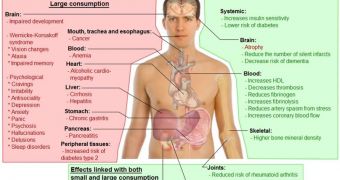In an effort to identify exactly how quickly alcohol acts on the human brain, scientists from the Heidelberg University Hospital, led by researcher Armin Biller, placed eight men and seven women in a Magnetic Resonance Imaging (MRI) machine, and gave them alcohol. The participants drank from straws the equivalent of three beers, which gave them a blood alcohol concentration of 0.05 to 0.06 percent, enough to impair driving performances. The researchers noticed that changes were evident within the brain less than six minutes after the alcohol was ingested.
The change was most evident in brain cells, which almost immediately started running on sugar extracted from alcohol, rather than its usual fuel, glucose. “Our study provides evidence for alternative energy utilization upon alcohol ingestion. The brain uses an alcohol breakdown product instead of glucose for energy demands,” Biller explained, quoted by LiveScience. The research team was amazed by the speed with which the drinks started influencing the brain cells, and said the results were unexpected.
Additionally, they noticed a decrease in the amount of creatine, a substance that plays a major role in protecting neurons from outside interference. With a lower concentration of the stuff, the brain cells become more exposed to danger, the study has concluded. The scientists also noticed a significant decrease in the levels of the substance choline, which is a key element that makes up brain cell membranes. “That probably indicates that alcohol triggers changes in the composition of cell membranes,” Biller further explained.
“Our follow-ups on the next day showed that the shifts in brain metabolites after moderate consumption of alcohol by healthy persons are completely reversible. However, we assume that the brain's ability to recover from the effect of alcohol decreases or is eliminated as the consumption of alcohol increases. The acute effects demonstrated in our study could possibly form the basis for the permanent brain damage that is known to occur in alcoholics. This should be clarified in future studies,” the expert wrote in the latest issue of the Journal of Cerebral Blood Flow and Metabolism.
Previous studies have demonstrated that damage done in the brain by alcohol is completely reversible, but that the brain's ability to heal may be hampered by smoking, or by continuous drinking habits. Further long-term studies are required to assess the exact effect that alcohol has on the human brain.

 14 DAY TRIAL //
14 DAY TRIAL //